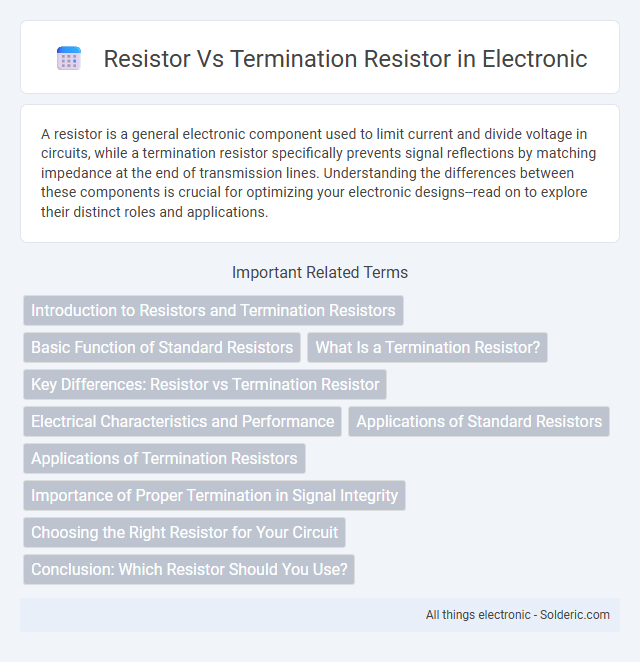A resistor is a general electronic component used to limit current and divide voltage in circuits, while a termination resistor specifically prevents signal reflections by matching impedance at the end of transmission lines. Understanding the differences between these components is crucial for optimizing your electronic designs--read on to explore their distinct roles and applications.
Comparison Table
| Feature | Resistor | Termination Resistor |
|---|---|---|
| Purpose | Limit current, divide voltage, bias circuits | Prevent signal reflections in transmission lines |
| Common Values | Ohms to Megaohms (e.g., 10 O to 10 MO) | Typically matched to characteristic impedance (e.g., 50 O, 75 O) |
| Electrical Role | Control current and voltage in circuits | Absorb signal energy to reduce reflections |
| Typical Applications | General electronic circuits, filtering, biasing | High-speed data lines, RF circuits, transmission lines |
| Placement | Anywhere in an electronic circuit | At the end of a transmission line or bus |
| Effect on Signal Integrity | Indirect, depends on circuit design | Crucial, prevents signal distortion and reflections |
Introduction to Resistors and Termination Resistors
Resistors are passive electrical components designed to limit current flow and adjust signal levels in circuits. Termination resistors specifically prevent signal reflections in transmission lines by matching impedance at cable ends. Proper use of termination resistors enhances signal integrity in high-frequency communication systems.
Basic Function of Standard Resistors
Standard resistors primarily regulate current flow and divide voltage within electronic circuits to ensure proper operation of components. Their basic function involves providing a fixed resistance value to control electrical energy dissipation and maintain circuit stability. Unlike termination resistors that match impedance in transmission lines to prevent signal reflection, standard resistors are fundamental for general resistance needs across various applications.
What Is a Termination Resistor?
A termination resistor is a specific type of resistor used to match the impedance of a transmission line, preventing signal reflection and ensuring data integrity in high-speed communication systems. Unlike a general resistor that primarily limits current or divides voltage, a termination resistor is precisely calculated to correspond with the characteristic impedance of cables or circuit traces. Its proper application reduces electromagnetic interference and signal distortion, enhancing the performance of Ethernet, CAN bus, and other serial communication protocols.
Key Differences: Resistor vs Termination Resistor
A resistor is a passive electrical component used to limit current and divide voltage in circuits, with varied resistance values tailored for general purposes. In contrast, a termination resistor is specifically designed to match impedance at the end of transmission lines, minimizing signal reflections and ensuring signal integrity in high-frequency communication systems. Key differences lie in their application focus: general current control versus signal termination for noise reduction.
Electrical Characteristics and Performance
Resistor and termination resistor differ significantly in electrical characteristics and performance, with the standard resistor primarily designed for general current limiting and voltage division, offering a broad range of resistance values and power ratings. Termination resistors specifically match the characteristic impedance of transmission lines, minimizing signal reflections and ensuring signal integrity in high-frequency applications such as data communication and RF circuits. Understanding these distinctions ensures Your circuits maintain optimal performance by selecting the proper resistor type to control noise, impedance, and signal distortion effectively.
Applications of Standard Resistors
Standard resistors are widely used in electronic circuits for current limiting, voltage division, and signal conditioning across consumer electronics, automotive systems, and industrial equipment. Unlike termination resistors, which are specifically employed to match impedance and minimize signal reflections in high-speed communication lines such as CAN bus or Ethernet, standard resistors perform general-purpose functions. Their versatility is essential in applications like filtering, biasing active components, and ensuring consistent circuit performance.
Applications of Termination Resistors
Termination resistors are primarily used in high-speed communication and data transmission lines such as Ethernet, SCSI, and CAN bus to prevent signal reflections and ensure signal integrity. These resistors match the impedance of transmission lines, minimizing electromagnetic interference and data errors in digital and analog circuits. In contrast, standard resistors serve broader purposes like current limiting, voltage division, and bias stabilization in various electronic devices.
Importance of Proper Termination in Signal Integrity
Proper termination resistors are crucial in maintaining signal integrity by preventing signal reflections and ensuring impedance matching in high-speed circuits. Standard resistors lack the specific value and placement needed for effective line termination, which can cause data corruption and timing errors. Using termination resistors tailored to the transmission line characteristics significantly reduces noise and signal distortion, enhancing overall system reliability.
Choosing the Right Resistor for Your Circuit
Choosing the right resistor for your circuit hinges on understanding the specific function it serves, with standard resistors primarily controlling current and voltage, while termination resistors are essential for minimizing signal reflections in high-speed communication lines. Termination resistors typically match the characteristic impedance of the transmission line, often 50 or 75 ohms, to ensure signal integrity and reduce electromagnetic interference. Your selection influences circuit performance, reliability, and noise reduction, making it critical to consider resistor type, resistance value, tolerance, and power rating.
Conclusion: Which Resistor Should You Use?
Termination resistors are essential for minimizing signal reflection in high-speed communication lines by matching the impedance of the transmission line, whereas standard resistors serve general current-limiting and voltage-dividing functions. In applications involving PCB traces, transmission lines, or high-frequency signals, a termination resistor matching the line's characteristic impedance ensures signal integrity and reduces noise. Use a standard resistor for basic circuits, but select a termination resistor specifically designed to maintain impedance and prevent signal degradation in high-speed data channels.
resistor vs termination resistor Infographic

 solderic.com
solderic.com